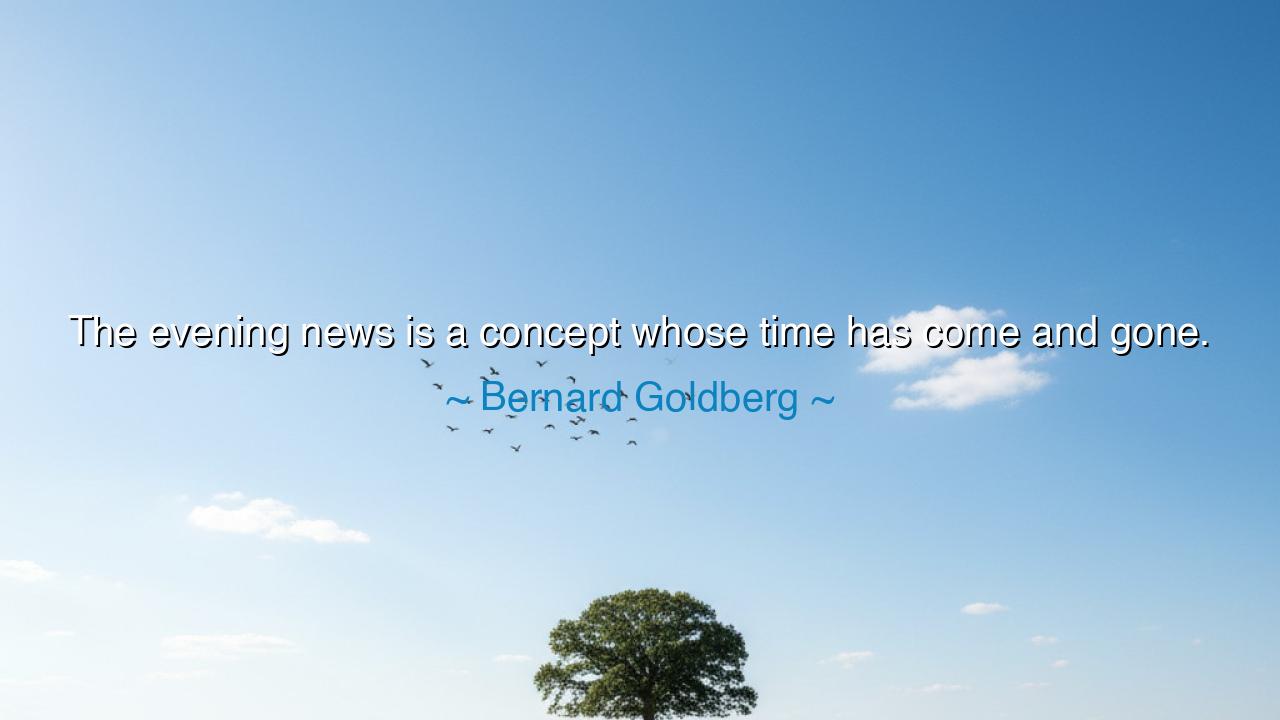
The evening news is a concept whose time has come and gone.






Bernard Goldberg, once a chronicler of the press, declared with clarity: “The evening news is a concept whose time has come and gone.” These words, though plain, carry the weight of ages. They speak of the rise and fall of institutions, the fleeting nature of what once seemed eternal, and the way mankind’s hunger for truth shifts with the tides of time. Once, the evening news was a sacred hour, when families gathered before the glowing screen to hear the voice of authority, to learn what had passed in the world that day. Yet, like all things born of human invention, it too has faded into obsolescence, its power scattered by the winds of change.
The ancients would have recognized this cycle. They knew that the mighty empires of their day—the palaces, the temples, the centers of knowledge—could stand for centuries, yet still crumble when their hour had passed. So it is with the evening news. In its time, it was the oracle of modern life, summoning millions to a single voice. But the world moved onward, and the multitude no longer wished to wait for the clock’s appointed hour. They sought immediacy, a constant stream of knowledge, and the oracle was abandoned, its throne overtaken by the ceaseless rush of the digital flood.
Consider the fate of the Roman Forum, where once the people gathered to hear the heralds and orators declare the news of empire. For centuries it was the center of civic life. Yet when Rome fell, its stones lay silent, and the crowds no longer gathered. In time, men found other places to share their voices, and the Forum became a ruin, a memory. So too the evening news—a modern forum now eroded, its stone replaced by the endless marketplace of information on every device and screen.
But Goldberg’s words are not merely about journalism; they are about the impermanence of all things. He reminds us that even the most powerful institutions are only guardians for a time. Nothing that man builds will endure forever unchanged. The evening news had its season: it brought order, comfort, and clarity. Yet when its usefulness waned, it dissolved like smoke into the air. This is the fate of all human constructs, from media to kingdoms, from traditions to technologies. Their power lies not in their permanence, but in their ability to serve while they are needed.
And here is the deeper wisdom: to cling to what has passed is to suffer. Those who mourn the death of the evening news as if it were eternal forget that life demands adaptation. The wise do not resist the river’s flow; they ride its current. Just as the ancients moved from oral tradition to scrolls, from scrolls to books, from books to broadcast, so too must we move from broadcast to the new forms of shared truth. The challenge is not to preserve the form, but to preserve the essence—the pursuit of truth and the hunger for understanding.
From this teaching arises a lesson for every soul: do not build your life upon what is fleeting. Cherish it while it serves you, but do not mistake it for eternity. The evening news may have faded, but the need for truth, connection, and wisdom remains eternal. Thus, instead of mourning the passing of an age, we must ask: how shall we carry these eternal needs into new forms? How shall we demand truth from the voices that now speak in the endless digital chorus?
Therefore, let Goldberg’s words guide you not into nostalgia, but into courage. Honor the past, but do not cling to it. See how swiftly the world changes, and be as swift in your spirit. Build your life not upon the forms that pass, but upon the eternal: wisdom, discernment, justice. For just as the evening news has come and gone, so too will the tools of today. Yet the seeker who trains the heart to seek truth will never be without light, no matter what new forum rises or falls.






AAdministratorAdministrator
Welcome, honored guests. Please leave a comment, we will respond soon